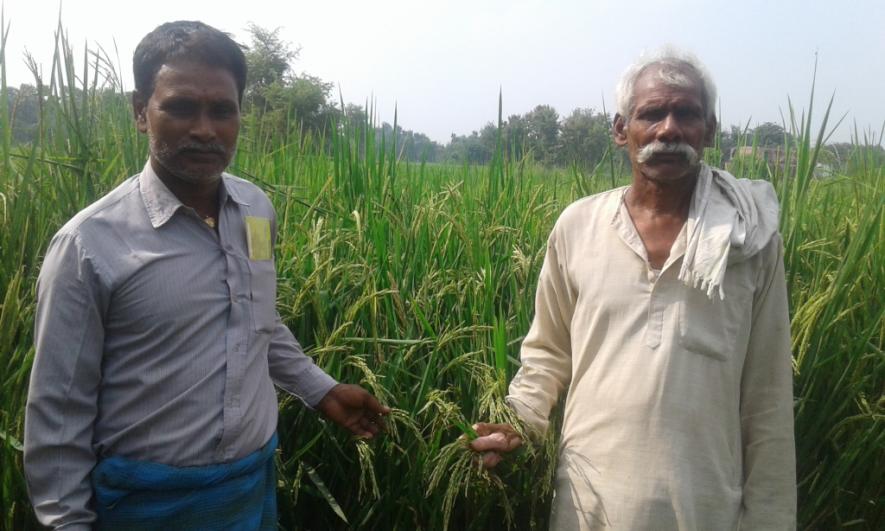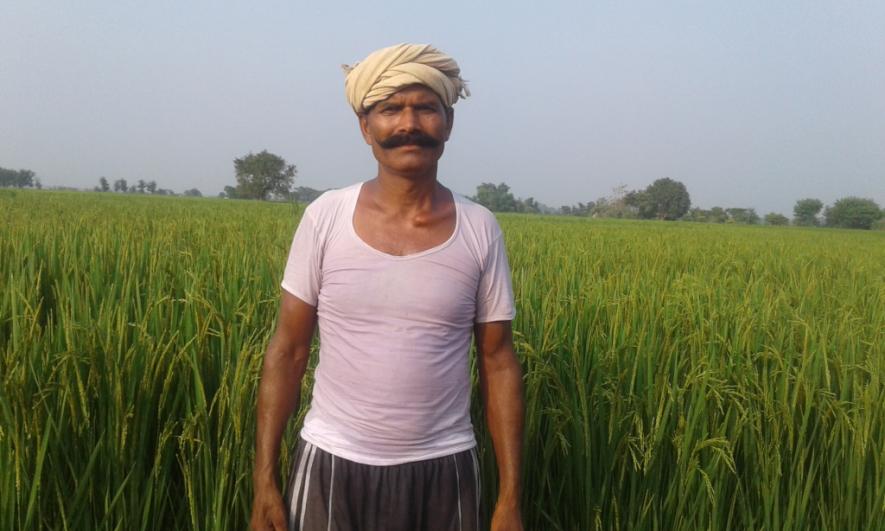Bihar Elections: ‘Double Income a Jumla,’ Say Farmers from Erstwhile Hub of 2nd Green Revolution

Jogeshwar and Nand Kishor in paddy field. | Image credit: Mohd Imran Khan
Paliganj (Bihar): Surendar Singh, a marginal farmer, expects a bumper paddy crop owing to the hard labour put in the field and surplus rains this year. But he is not hopeful about getting the right returns for his crop and is upset that his income or profit will remain low as usual. He has dismissed the government claim of doubling farmers’ income by 2022.
“Farmers’ income will never double if the current government policies continue,” says Surendar, a resident of Izarta village under Paliganj block as he sits along with a group of fellow villagers, most of whom are farmers.
Paliganj is an Assembly constituency presently represented by Jai Vardhan Yadav, who won last Assembly polls as a Rashtriya Janata Dal candidate. He switched sides ahead of polls and now, he is in the fray as a candidate for the Janata Dal-United (JD-U), an ally of the Bharatiya Janata Party (BJP). Besides, there is Communist Party of India (Marxist-Lenninist) candidate Sandip Saurav, a former JNUSU leader, supported by the Grand Alliance. The Lok Janshakti Party has fielded former BJP MLA Usha Vidhyarti as its candidate against the JD-U, which will lead to the Paliganj seat witnessing a triangular contest.
Over a decade ago, Paliganj, about 55 km from Patna, was identified by former president A P J Abdul Kalam as the hub of the second green revolution in the country for its potential of having hard-working farmers and fertile land. Kalam visited Paliganj, including the villages, four times between 2003 and 2011; he encouraged and motivated farmers to go for scientific and innovative practices in agriculture to increase yield of traditional crops and provided help to cultivate cash crops such as Japanese mint, lemongrass, java citronella, basil and rose and marigold flowers to increase their income.
Surendar, who owns a three bigha land, said that farming did not provide him and his family with a good living standard because their income is declining instead of increasing. “One thing is certain, the government is capable of showing double income of farmers on paper if not in reality. We are not getting proper wages for our hard labour round the year. Again, I will be forced to go for distress paddy sale to traders after harvest next month,” he says.
The much-hyped and ambitious agricultural roadmap (2012-22) of the Nitish Kumar government also failed to help farmers like him, Surendar claims. “Such a plan only sounds good on paper as its implementation is only for name’s sake,” he says.
Paliganj Bitarni Krishak Samiti secretary Balmiki Sharma, who has worked closely with APJ Abdul Kalam to help farmers prosper by producing cash crops and medicinal plants, admits that initially hundreds of farmers started cultivation of cash crops and used Kalam’s tips to increase yield of paddy, wheat, pulses and oilseed. “But due to the problem of not getting proper rate for their produce in absence of market linkage, many farmers stopped the medicinal plants’ cultivation. Only dozens of them are continuing till date,” he says.
Balmiki Sharma, who has been working with farmers in over 50 villages, says double income for farmers will not be possible in the near future. “How will farmers’ income double when they are not getting right rate for their produce? Besides, only 10% of different government schemes for benefit of farmers reach them. There is a big lacuna,” he says.
Agriculture is the backbone of Bihar’s economy, employing 81% of the workforce and generating nearly 42% of the state’s domestic product, according to the state government’s figures.
Kavindar Sharma, a big farmer, says, “Farmers are not even getting the rate (Minimum Support Price) fixed by the government. Is this how our income will rise? Farmers are facing several problems but their income is low. It is a major issue.” Kavinder owns 10 acres land and has taken another 10 acres on contract or lease.
Kavinder says that in January this year, he sold 600 quintals of paddy to the government-run primary agriculture cooperative societies (PACS), but he is yet to get his payment.
His words are echoed by another farmer Devendar Kumar. “No one cares for farmers. The government has taken us for granted. Factory owners and industrialists are free to fix rate of their products but farmers are not. Farmers’ produce rate is fixed by a third party.”
Devendar says that decreasing income is forcing marginal and smallholding farmers to migrate outside the state to earn livelihood by working in factories.
Balmiki says if policies for farmers are made in air-conditioned, posh offices in Delhi, those will never benefit farmers. “Policymakers should talk to farmers, listen to them and spend some days in villages to understand the reality on the ground. Much publicised plans to double farmers’ income will never succeed as they are far removed from the reality,” he adds.
He further added that after being inspired by Kalam, he started cultivating mentha in 2 acres and lemongrass in 1 acre. But after a few years, he stopped their cultivation because of loss due to marketing problems.
A marginal farmer from Izarta, Shriniwas Singh, who owns five acres of land, along Devnarayan Singh and Raghuvendar Singh, say in one voice that until the government ensures a fixed rate for farm produce, nothing with change. “The recently passed farm Bills will not benefit farmers, they will harm us. Farmers are already struggling for survival. Why is the government not making it clear that farmers’ produce will not be purcharsed below a fixed price, like MSP?” Shriniwas Singh asks.
The Singhs and Sharmas belong to the politically influential Bhumihar caste, which is a traditional support base of the ruling NDA. But now they are also angry with the government, and particularly with Chief Minister Nitish Kumar. They say the people will reject Nitish Kumar in the upcoming elections even if the government does not change. Izarta has a population of 1,117 as per the last Census and there are 50 households belonging to the Bhumihar community.
Nearly 11 km from Izarta, farmers of Chandhaus village also express their helplessness and refuse to believe the government's double income plan for farmers. Jogeshwar Singh and Nand Kishor Singh say the government has been only talking and not doing anything.
“The government is lying about doubling income. How is it possible when farmers are not even getting MSP?” asks Jogeshwar who owns a six-bigha land.
Nand Kishor, who owns 20 bighas of land, also remains sceptical about the double income. “We are forced to sell produce to traders because there is no chance of getting MSP and the government is fooling us to double our income. The produce rate is uncertain; we get less than what we invest,” he says.
Both Jogeshwar and Nand Kishor say they are no more cultivating medicinal plants and flowers. “I was cultivating mentha in 2.5 acres, but no more as it incurs loss. There was a time when nearly 25 farmers of my village were cultivating menthe but that number has been reduced to two or three now,” Nand Kishor says.
Both Jogeshwar and Nand Kishor belong to the OBC Kurmi community, to which CM Nitish Kumar belongs too. The disillusionment about the current government among farmers across caste lines indicates that the upcoming elections will be tough for the JD-U.
Another marginal farmer from Chandhaus village, Omnarayan Singh, who owns two acres land and has taken six acres on contract, questions the government claim of doubling farm income. "It is a baseless claim, there is no truth in it," he says.

Omnarayan Singh standing in his paddy field. | Image credit: Mohd Imran khan
Omnarayan also says the recently passed Farm bills are anti-farmer—“At present, hardly 10% of farmers are able to sell their paddy and wheat to government run PACS; 90% farmers hardly get MSP. The government should ensure MSP for produce of all farmers. The Farm bills are totally silent on it.”
Pramod Kumar Yadav and Harendar Yadav from Chandhaus say the promise of double income is another “jumla” of the government as it is not providing farmers MSP. “Nothing will happen; this government will only construct Ram temple, rename places and favour Ambani and Adani.” they say.
The dalits of Fatehpur, Bela and Akbarpur, mostly landless farmers, are also not showing support to the ruling NDA. ”We will decide who to support based on whether the road connecting our village is constructed. Our concrete path is blocked by some powerful people. We are forced to pass the deep knee water to reach home,” a group of dalits say.
According to Muzzu Khan, a resident of Jamharu village, the Yadav, muslim and dalit support will play an important role in the poll outcome as they together form the largest bloc of voters.
Get the latest reports & analysis with people's perspective on Protests, movements & deep analytical videos, discussions of the current affairs in your Telegram app. Subscribe to NewsClick's Telegram channel & get Real-Time updates on stories, as they get published on our website.























